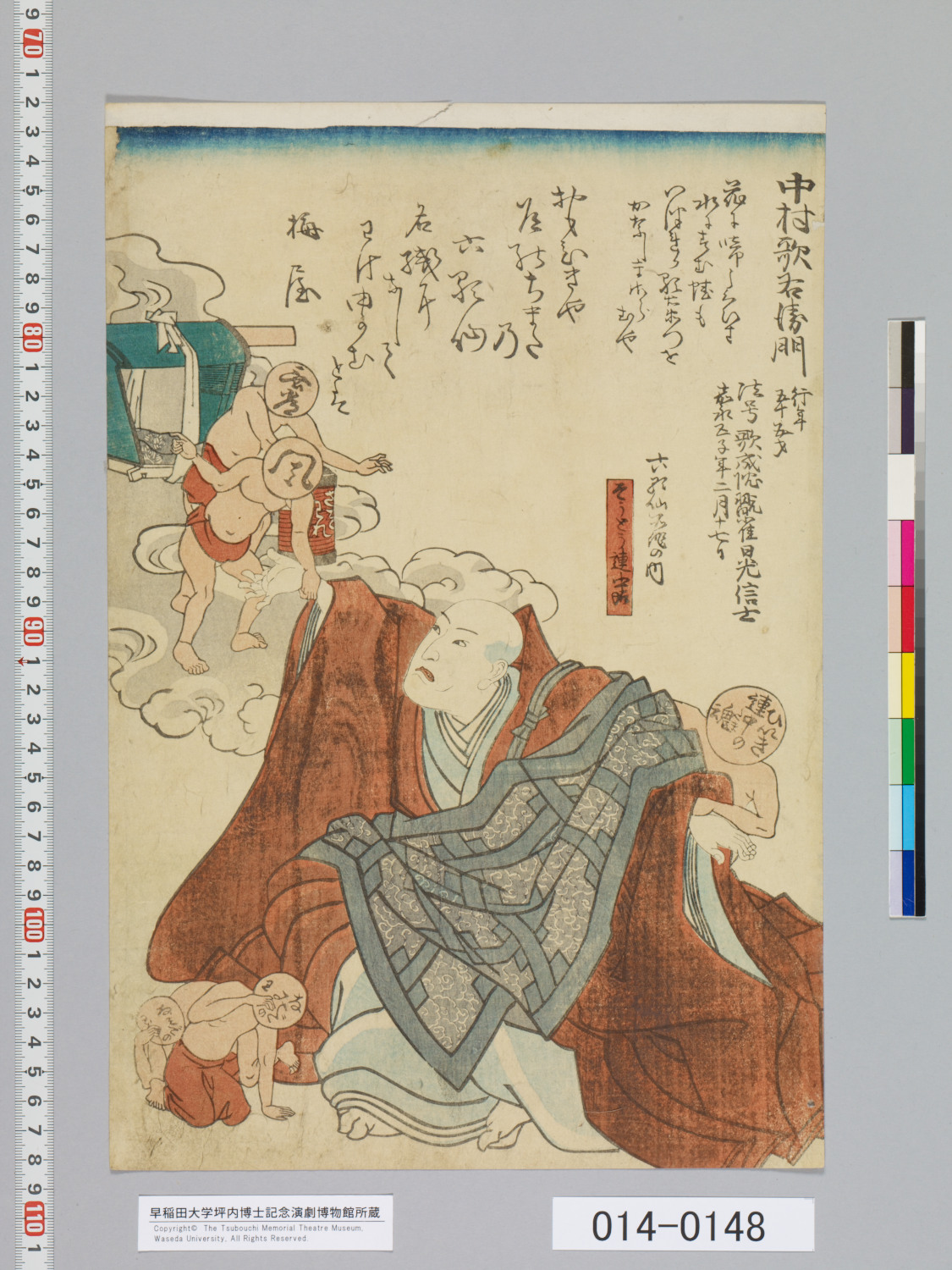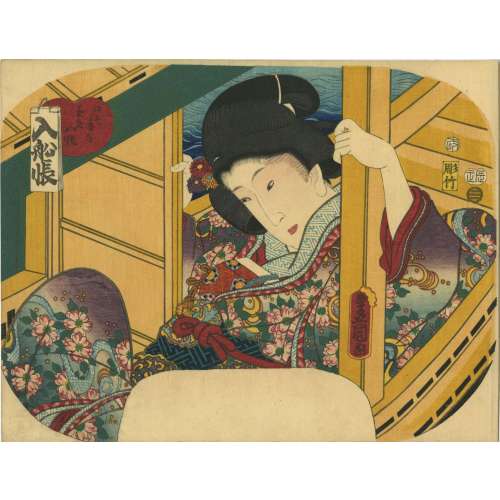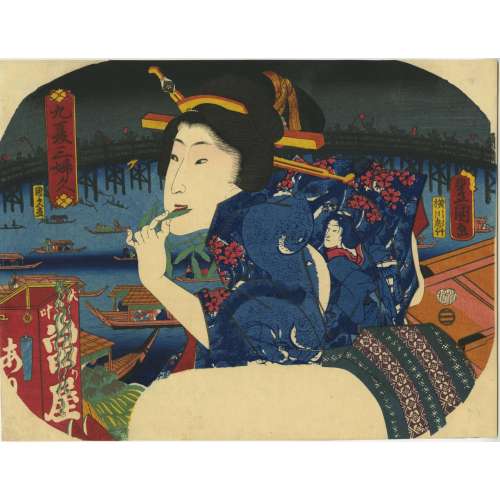Signed: Ichiyosai Kuniyoshi ga in a red cartouche and sealed with paulownia (kiri mon).
Date seal and double nanushi censor seals: Fuku & Muramatsu, 1853 (Kaei 6, 2nd month).
Size: Uchiwa-e (untrimmed fan print) 296 x 230 mm.
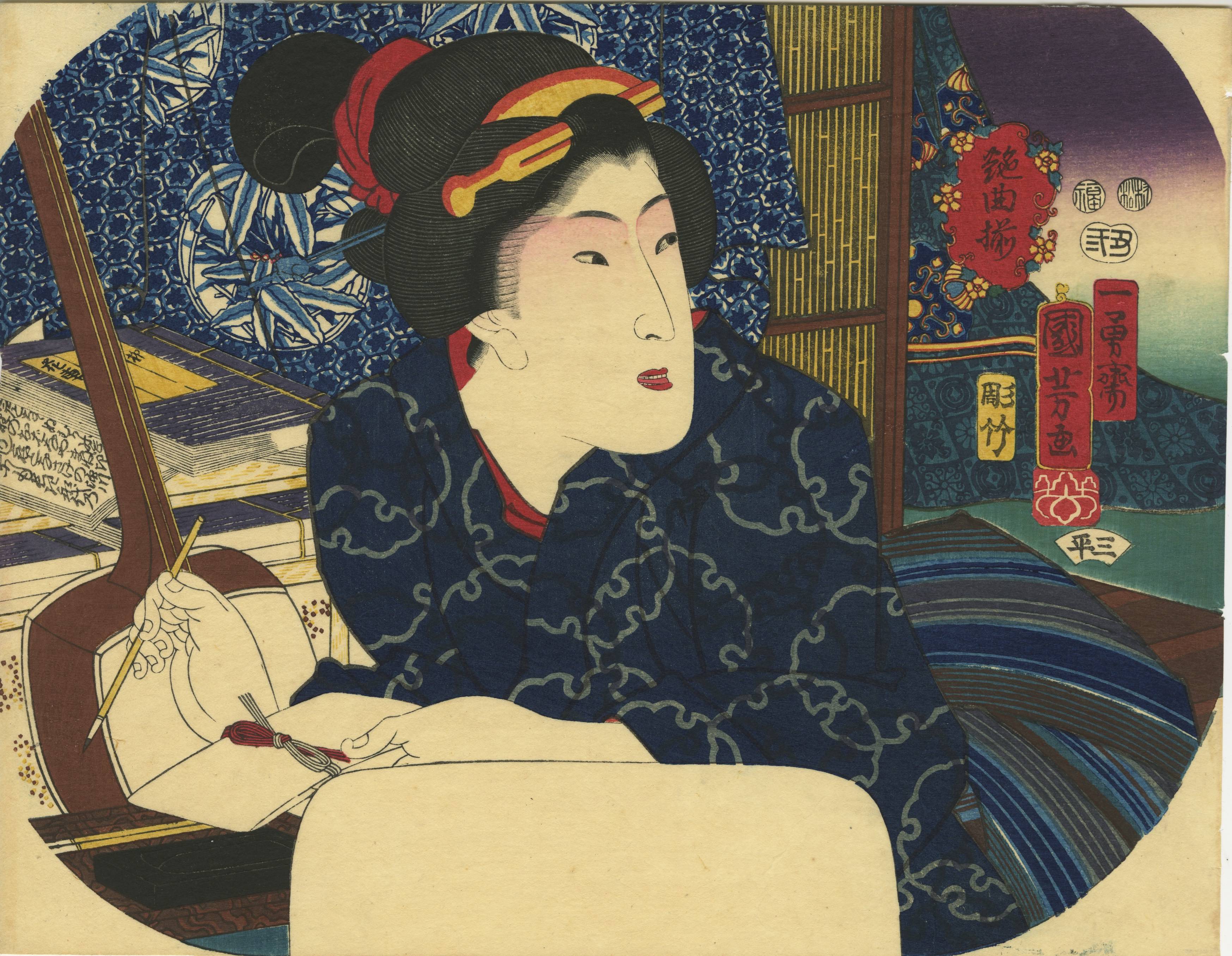 SVJP-0303.2019 |
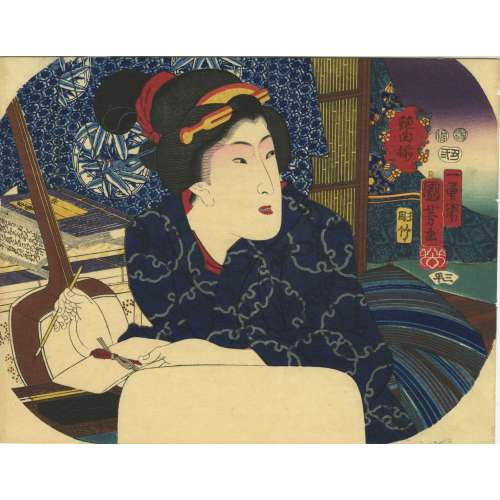
Signed: Ichiyosai Kuniyoshi ga in a red cartouche and sealed with paulownia (kiri mon).
Date seal and double nanushi censor seals: Fuku & Muramatsu, 1853 (Kaei 6, 2nd month).
Size: Uchiwa-e (untrimmed fan print) 296 x 230 mm.
 SVJP-0303.2019 |
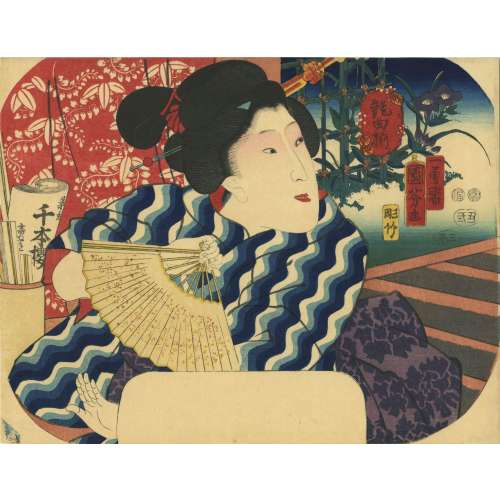
Signed: Ichiyosai Kuniyoshi ga in a red cartouche and sealed with paulownia (kiri mon).
Date seal and double nanushi censor seals: Fuku & Muramatsu, 1853 (Kaei 6, 2nd month).
Size: Uchiwa-e (untrimmed fan print) 229 x 294 mm.
Provenance: The Collection of Paul F. Walter, Christie's, New York, 2017, lot 338; sold together with 10 other fan prints for $27,500. Before: Christie's, New York, 1994, lot 145 ($4,830). Ref: [LIB-1693.2018] The Collection of Paul Walter. — NY: Christie's, 2017, p. 361. Ref: Israel Goldman, Catalogue 2018, № 41: "Utagawa Kuniyoshi (1797-1861) A Woman on a Terrace Dancing with a Fan. From the series Enkyoku zoroi (Collection of Charming Music). 1853. Fan print. 22.9 x 29.4 cm. Provenance: Japanese Prints, Paintings and Screens, Christie's, New York, 1994, lot 145 ($4,830); The Collection of Paul F. Walter, Christie's, New York, 2017, lot 338. Fine impress." Known prints in this series:
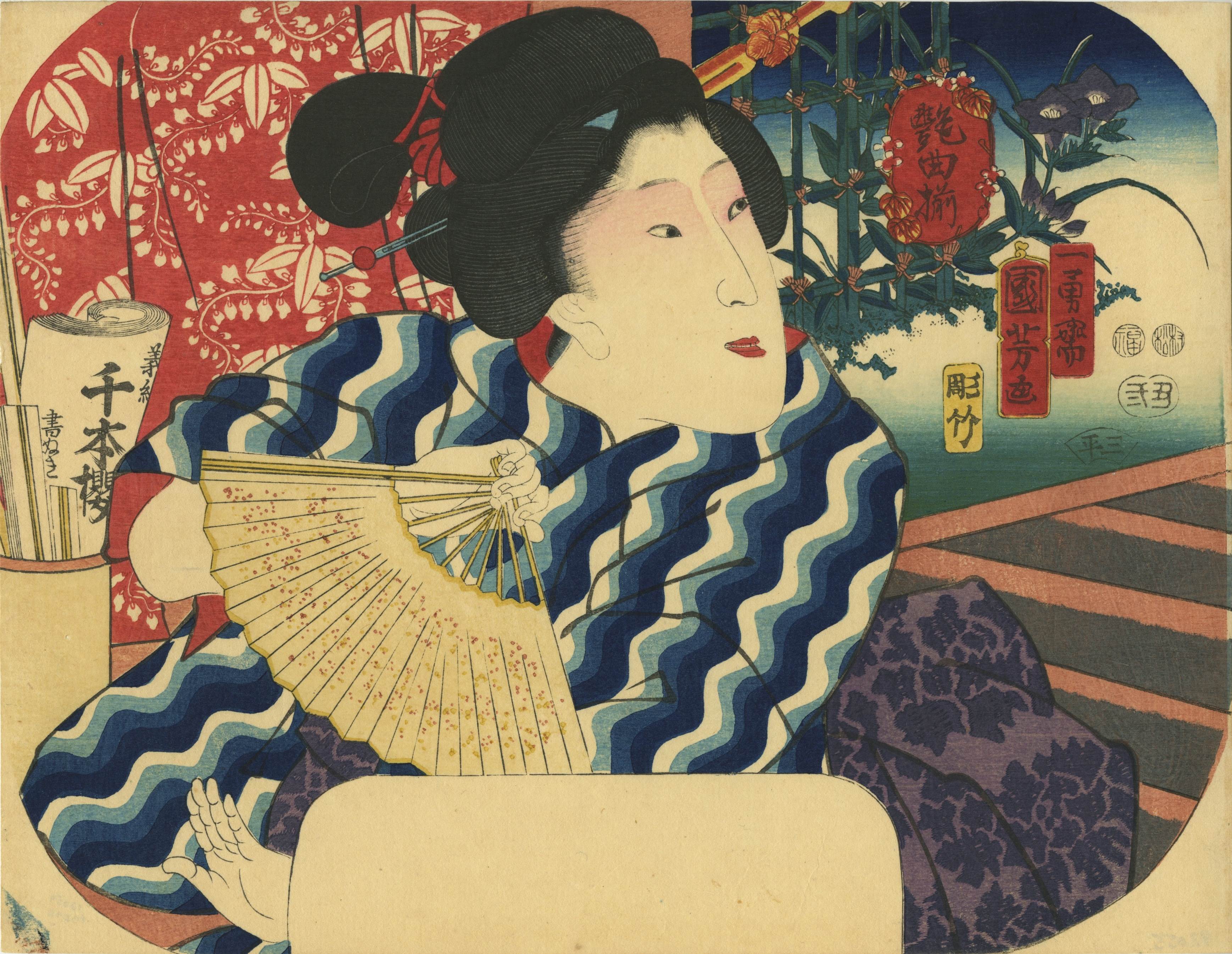 SVJP-0251.2018 |
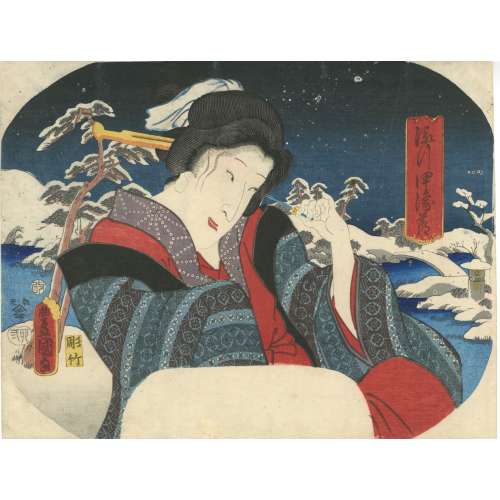
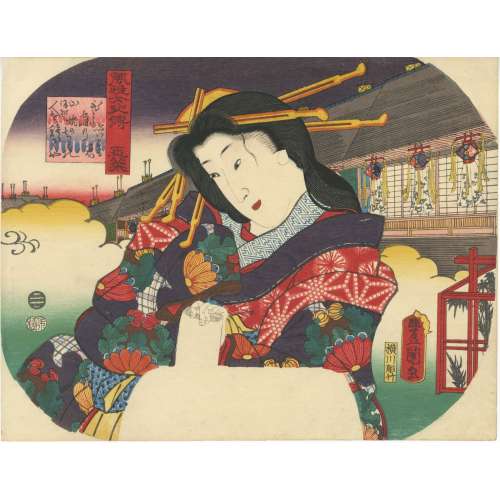
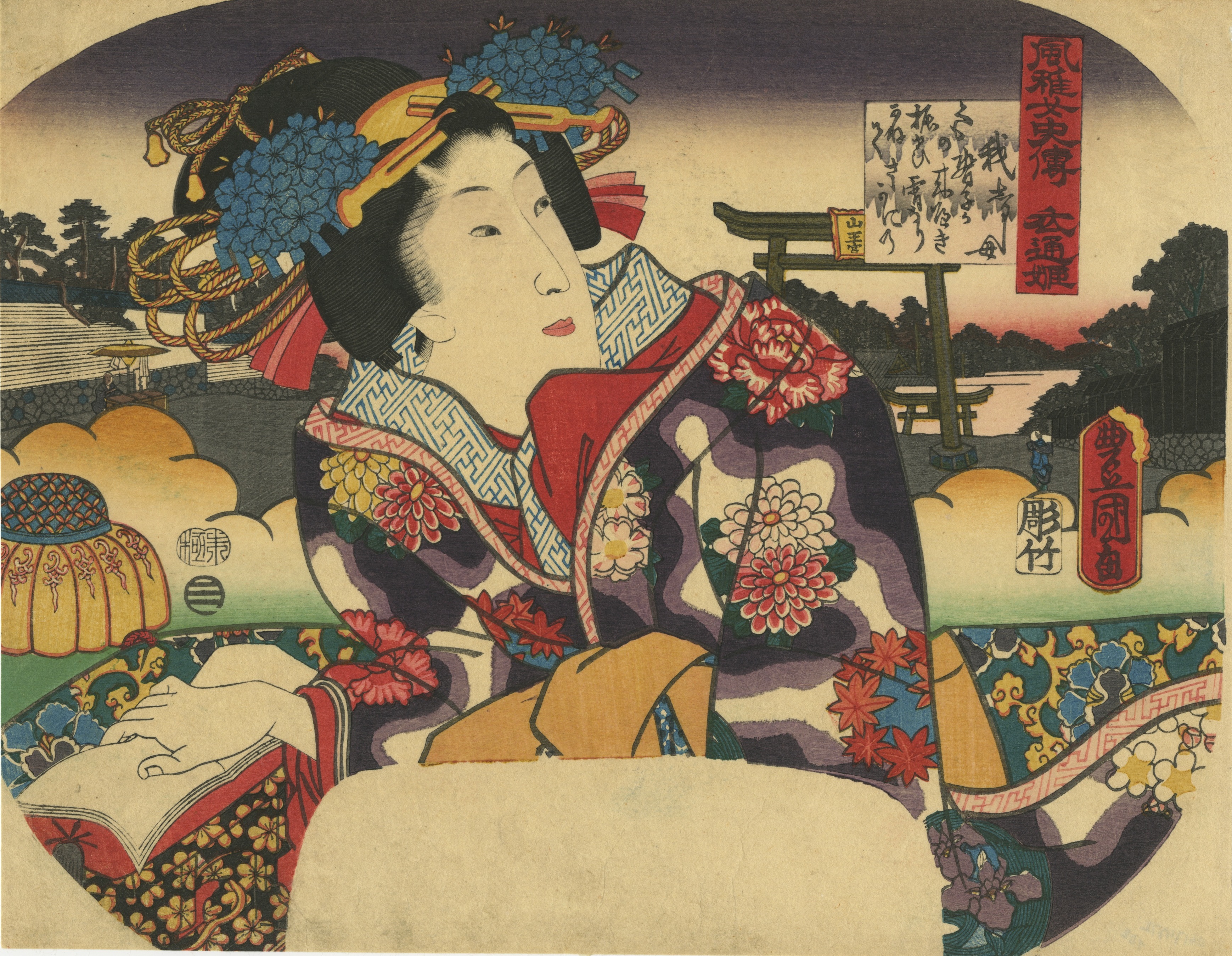 SVJP-0400.2023 — Saiko:
SVJP-0400.2023 — Saiko:
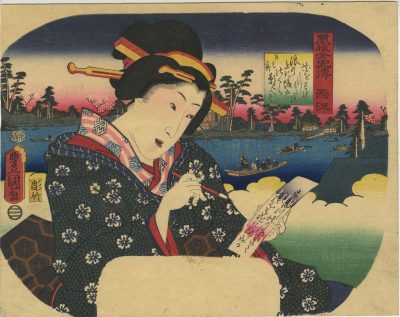 Note by Elena Varshavsky:
Tamagiku [玉菜] (Japanese, 1702 – 1726) – Precious Chrysanthemum (translated also as Jade Chrysanthemum; one can say also Gem Chrysanthemum). She was a courtesan famous for her beauty, kind heart, and countless artistic accomplishments. She died young and was deeply grieved by the establishment of Nakamanji-ya (中万字屋) for which she worked, and beyond. Her memory was celebrated during the Bon festival of the commemoration of the dead, and lanterns were hung at the gallery of that establishment and other neighbouring ones to commemorate her and appease her soul. These lanterns are seen behind her. Kabuki plays were continuously dedicated to her, she figured in Edo period literature and was often portrayed on ukiyo-e prints. In many cases, she was shown with the lanterns associated with her. Those lanterns were called “Tamagiku Lanterns”.
Other depictions of Tamagiku:
Note by Elena Varshavsky:
Tamagiku [玉菜] (Japanese, 1702 – 1726) – Precious Chrysanthemum (translated also as Jade Chrysanthemum; one can say also Gem Chrysanthemum). She was a courtesan famous for her beauty, kind heart, and countless artistic accomplishments. She died young and was deeply grieved by the establishment of Nakamanji-ya (中万字屋) for which she worked, and beyond. Her memory was celebrated during the Bon festival of the commemoration of the dead, and lanterns were hung at the gallery of that establishment and other neighbouring ones to commemorate her and appease her soul. These lanterns are seen behind her. Kabuki plays were continuously dedicated to her, she figured in Edo period literature and was often portrayed on ukiyo-e prints. In many cases, she was shown with the lanterns associated with her. Those lanterns were called “Tamagiku Lanterns”.
Other depictions of Tamagiku:
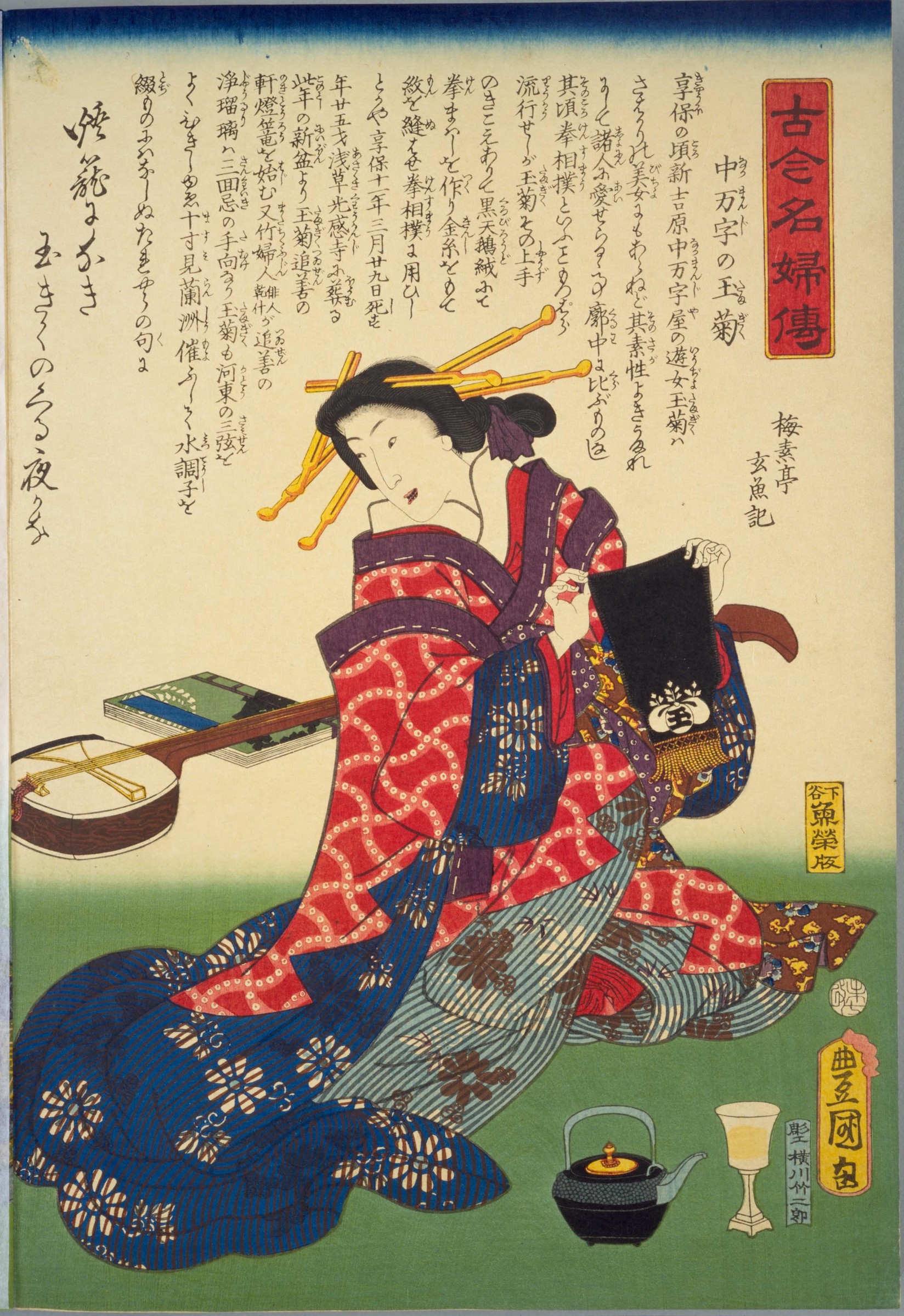
Tamagiku (Ancient and modern women's biography) by Kunisada, 1859.
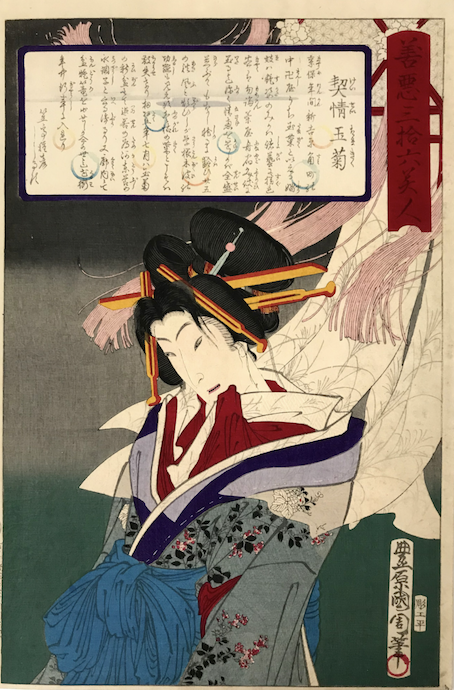
Courtesan Tamagiku by Kunichika.
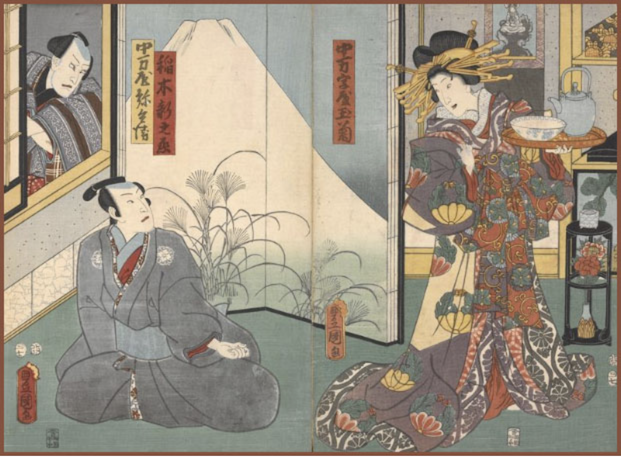
Tamagiku of the Nakamanjiya, Inaki Shinnojō, and Nakamanjiya Yahei (looking through the window) by Kunisada.

Nakamanji-Ya Tamagiku by Kunisada

Nakamanji-Ya Tamagiku by Kunisada, 1857
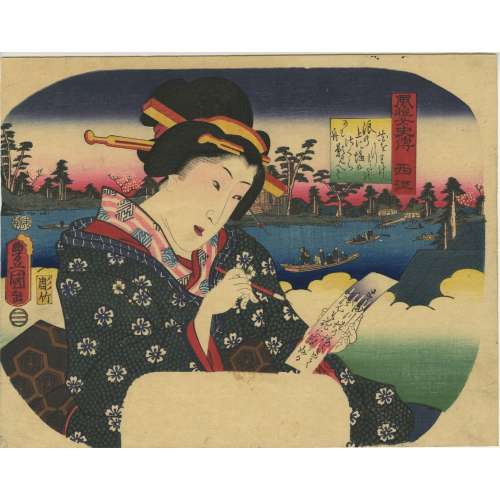

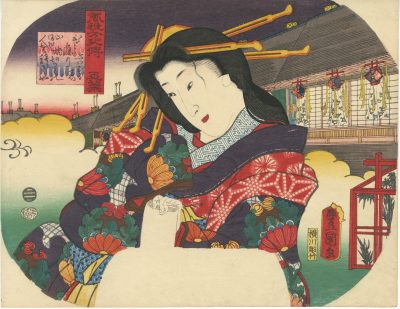
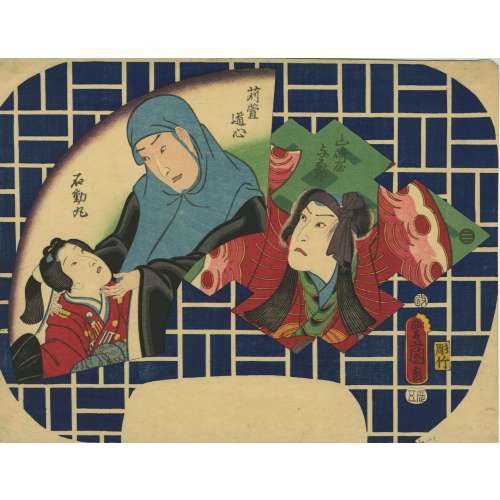
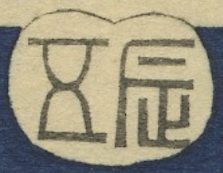 Uncut fan print (uchiwa-e) depicting Onoe Kikugorō IV as Karukaya Dōshin parting from his son, Ishidomaru (played by Ichimura Uzaemon XIII), and Kawarasaki Gonjūrō I as Yamazakiya Yogoro in the kabuki play Karukaya Dōshin Tsukushi no Iezuto [苅萱桑門筑紫𨏍], written by Namiki Sōsuke [並木宗輔] (Japanese, 1695 – 1751) and performed at Ichimuraza [市村座] in 05/1856.
Media: Fan print [団扇絵] (Uchiwa-e); size: 235 x 305 mm.
Actors:
Onoe Kikugorō IV [四代目 尾上菊五郎] (Japanese, 1808 – 1860); other names: Onoe Baikō IV, Onoe Eizaburō III, Onoe Kikue, Nakamura Tatsuzō, Nakamura Kachō.
Onoe Kikugorō V [五代目尾上菊五郎] (Japanese, 1844 – 1903 other names: Onoe Baikō V, Ichimura Kakitsu IV, Ichimura Uzaemon XIII [十三代目市村羽左衛門], Ichimura Kurōemon.
Ichikawa Danjūrō IX [市川団十郎] (Japanese, 1838 – 1903); other names: Kawarasaki Sanshō, Kawarasaki Gonnosuke VII, Kawarasaki Gonjūrō I, Kawarasaki Chōjūrō III.
Plot: It was a popular belief at one time that jealous women had their hair transformed into writhing serpents and Kato Sayemon Shige-Uji, a daimyo of Tsukushi, a much-married man, suffered from the delusion that his wife was so affected. He fled to the mountains to escape her and led the life of a hermit under the name of Karukaya Doshin [苅萓道心]. One day, on Mount Kōya (高野山, Kōyasan) Karukaya meets a young man who was wandering in the mountains. Being questioned, the youth tells his name, Ishidomaru, and elicits the information that he is seeking his lost father. Karukaya then recognizes the boy as his own son, but firm in the resolve to remain lost to the world, he refrains from disclosing himself, and bids the youth return home.
Provenance: Paul F. Walter (American, 1935 – 2017).
Ref.:
Uncut fan print (uchiwa-e) depicting Onoe Kikugorō IV as Karukaya Dōshin parting from his son, Ishidomaru (played by Ichimura Uzaemon XIII), and Kawarasaki Gonjūrō I as Yamazakiya Yogoro in the kabuki play Karukaya Dōshin Tsukushi no Iezuto [苅萱桑門筑紫𨏍], written by Namiki Sōsuke [並木宗輔] (Japanese, 1695 – 1751) and performed at Ichimuraza [市村座] in 05/1856.
Media: Fan print [団扇絵] (Uchiwa-e); size: 235 x 305 mm.
Actors:
Onoe Kikugorō IV [四代目 尾上菊五郎] (Japanese, 1808 – 1860); other names: Onoe Baikō IV, Onoe Eizaburō III, Onoe Kikue, Nakamura Tatsuzō, Nakamura Kachō.
Onoe Kikugorō V [五代目尾上菊五郎] (Japanese, 1844 – 1903 other names: Onoe Baikō V, Ichimura Kakitsu IV, Ichimura Uzaemon XIII [十三代目市村羽左衛門], Ichimura Kurōemon.
Ichikawa Danjūrō IX [市川団十郎] (Japanese, 1838 – 1903); other names: Kawarasaki Sanshō, Kawarasaki Gonnosuke VII, Kawarasaki Gonjūrō I, Kawarasaki Chōjūrō III.
Plot: It was a popular belief at one time that jealous women had their hair transformed into writhing serpents and Kato Sayemon Shige-Uji, a daimyo of Tsukushi, a much-married man, suffered from the delusion that his wife was so affected. He fled to the mountains to escape her and led the life of a hermit under the name of Karukaya Doshin [苅萓道心]. One day, on Mount Kōya (高野山, Kōyasan) Karukaya meets a young man who was wandering in the mountains. Being questioned, the youth tells his name, Ishidomaru, and elicits the information that he is seeking his lost father. Karukaya then recognizes the boy as his own son, but firm in the resolve to remain lost to the world, he refrains from disclosing himself, and bids the youth return home.
Provenance: Paul F. Walter (American, 1935 – 2017).
Ref.:
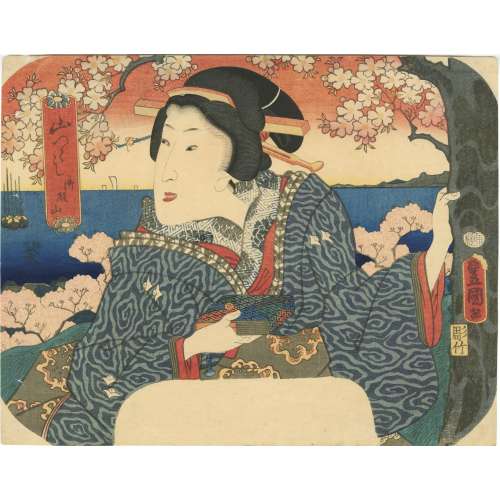
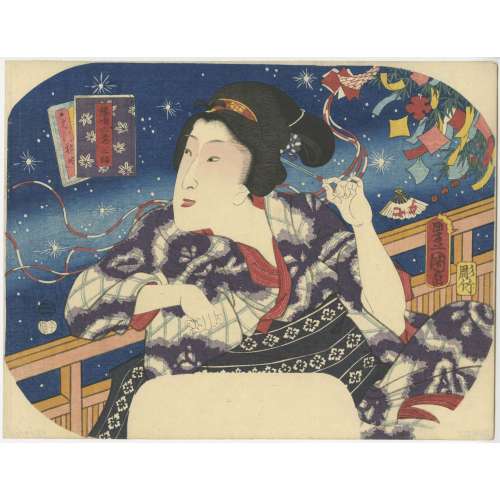
A young woman adjusting her hairpin on a balcony during the Tanabata festival, as inscribed on the white folding fan: [七夕] (Tanabata).
Inscription on the blue book (print title): Early autumn [はつ秋や] (hatsu akiya), inscription on the purple book (series title): Short love songs, second volume [端唄の意 二編] (Hauta no kokoro nihen). According to Marks (2010), Hauta no kokoro nihen series of fan prints was published by Ibaya in 1858 (p. 267|P6871).
The series refers to love songs of a certain type popular in late Edo. They were performed with the accompaniment of a shamisen, “Seven herbs of autumn, the song of the insects is not heard; the bodies of lightning bugs are burnt, and the precious writings of love are getting thinner like the song of the insects as I am waiting for you. So, on an early autumn evening, I spot the glitter of a lightning bug that lingered among the autumn grasses, and while listening to the pine cricket, I am singing with my heart troubled by love". [Tokyo National Museum; translation provided by Elena Varshavsky].Tanabata [たなばた] or [七夕] – meaning "Evening of the seventh", also known as the Star Festival [星祭] (Hoshi matsuri) – is a Japanese festival originating from the Chinese Qixi Festival. One popular Tanabata custom is to write one's wishes on a piece of paper and hang that piece of paper on a specially erected bamboo tree, in the hope that the wishes become true.
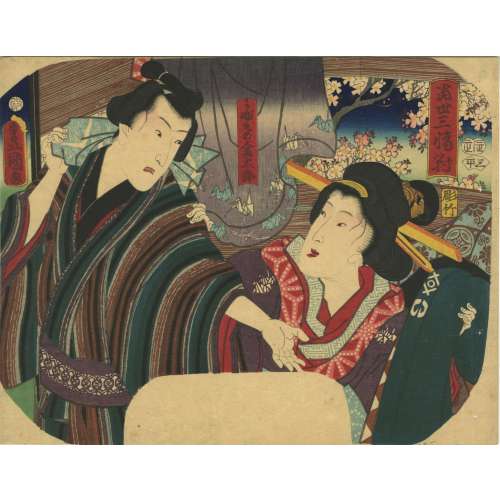
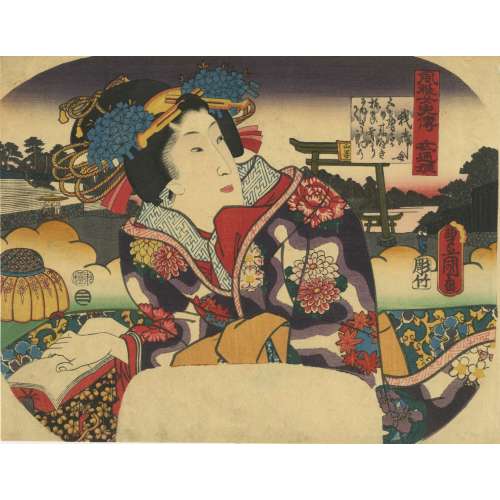
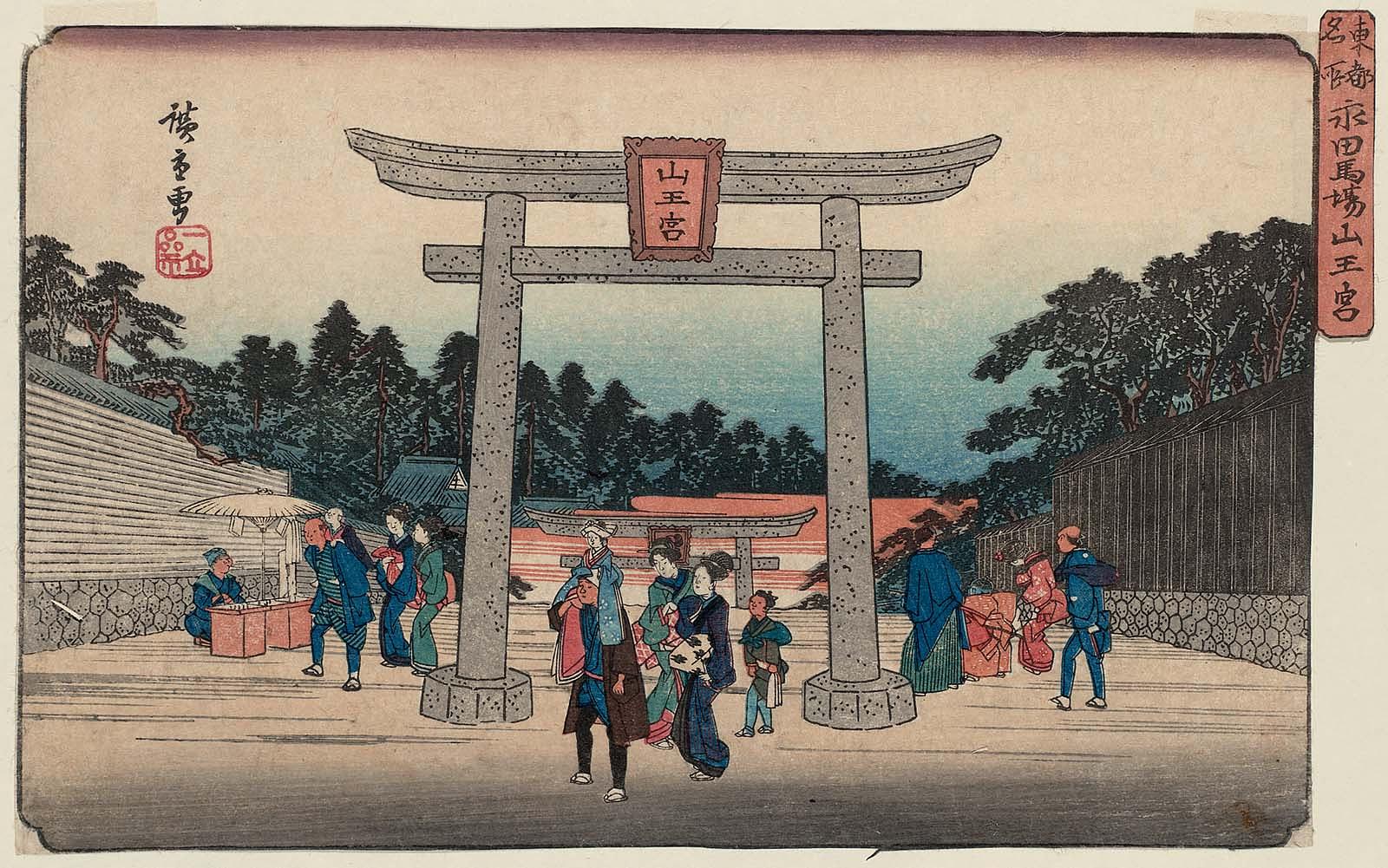 Other prints from the same series in this collection:
SVJP-0343.2021 — Tamagiku:
Other prints from the same series in this collection:
SVJP-0343.2021 — Tamagiku:
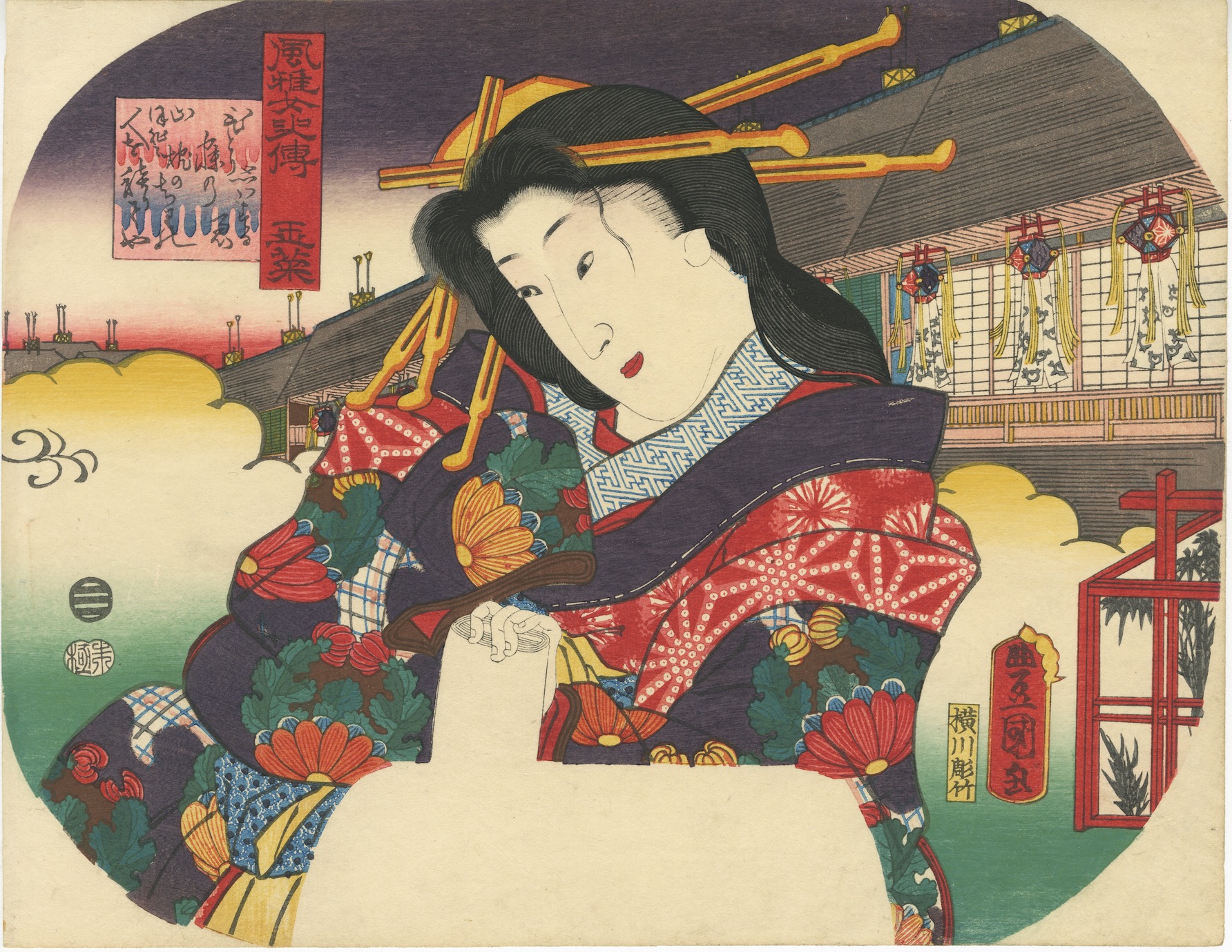 SVJP-0400.2023 — Saiko:
SVJP-0400.2023 — Saiko:
 Note: Special thanks to Horst Graebner, who helped decipher and understand the meaning.
Note: Special thanks to Horst Graebner, who helped decipher and understand the meaning.
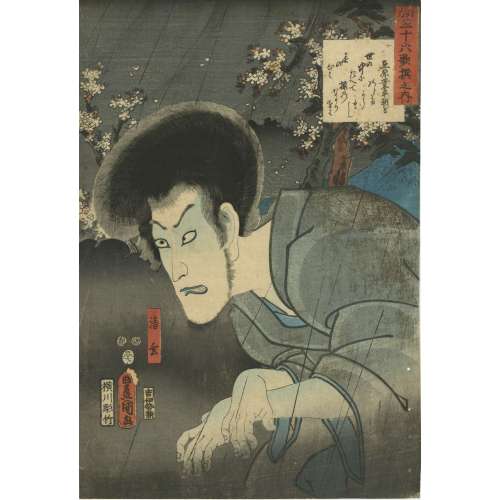
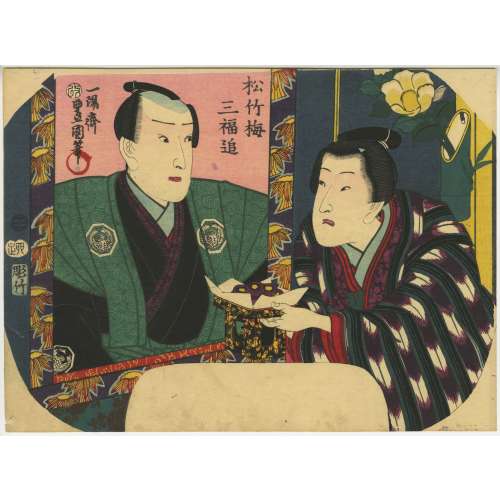
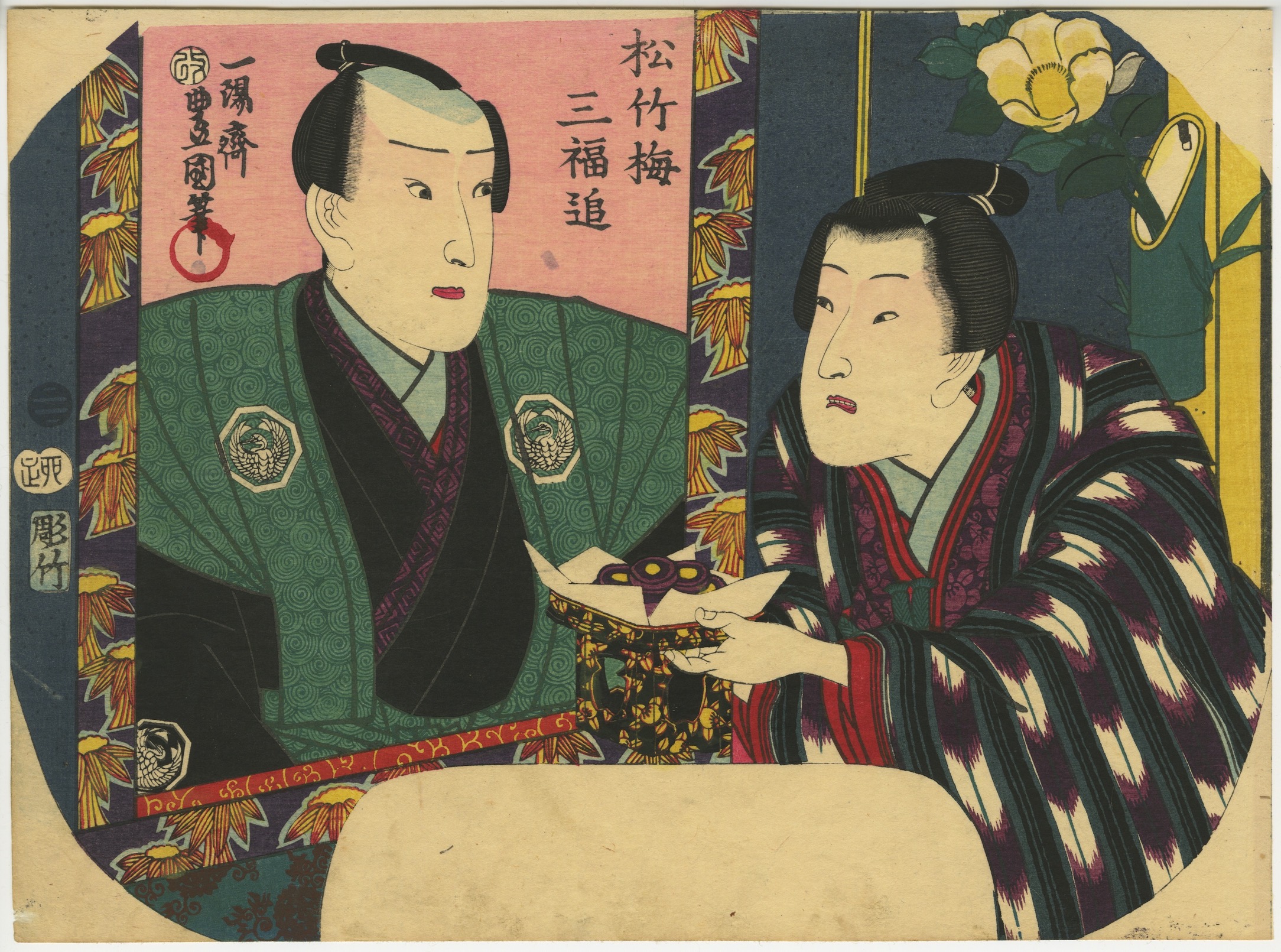 SVJP-0335.2021 |
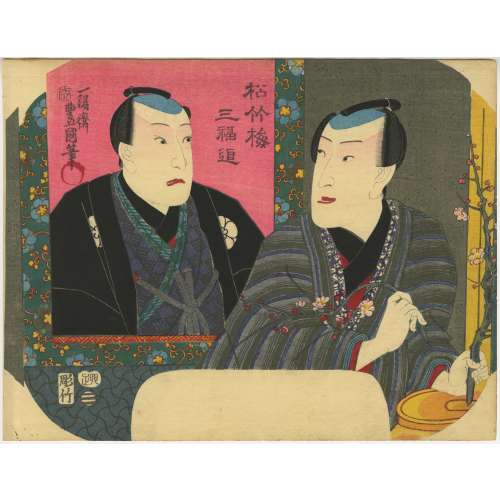
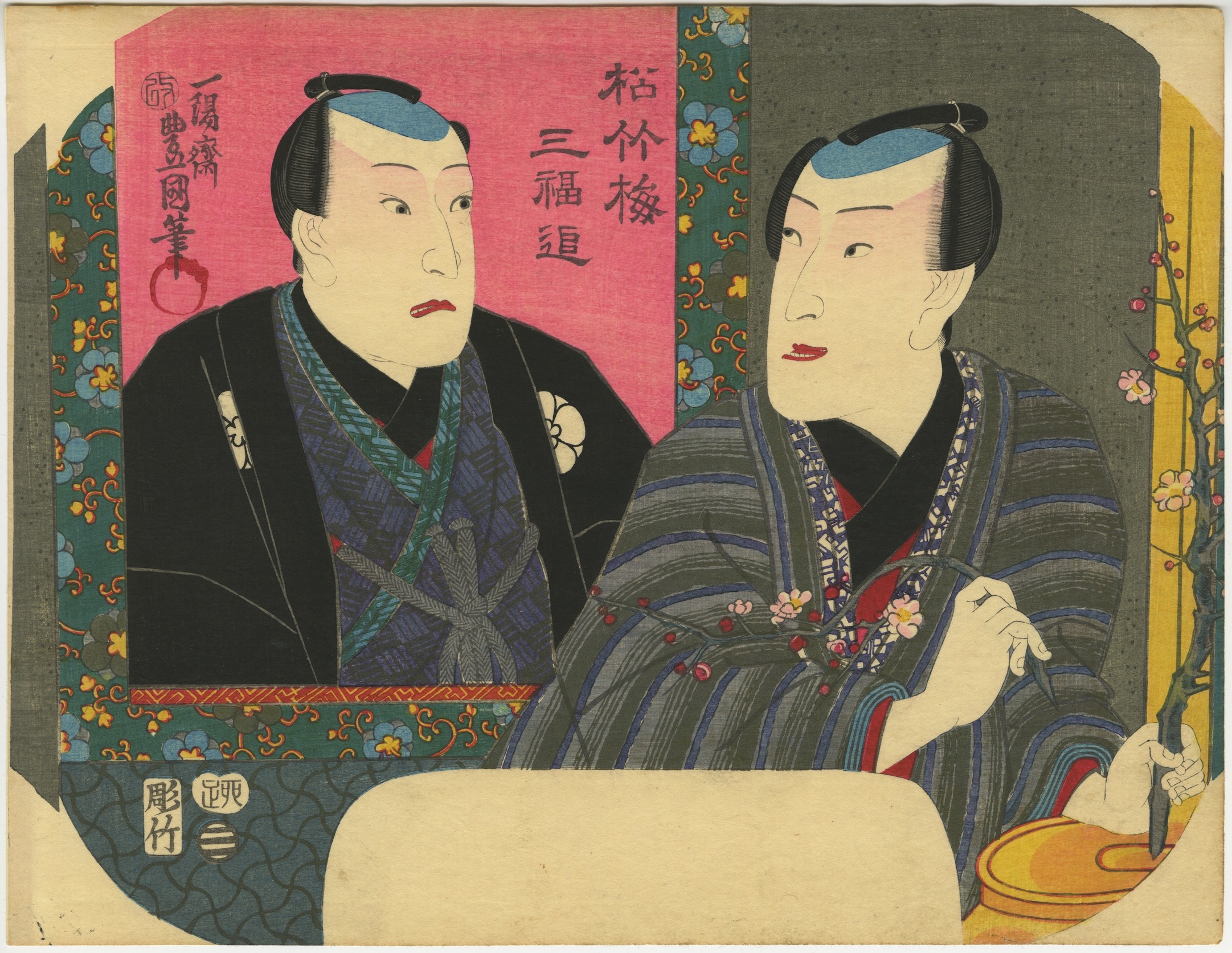 SVJP-0336.2021 |
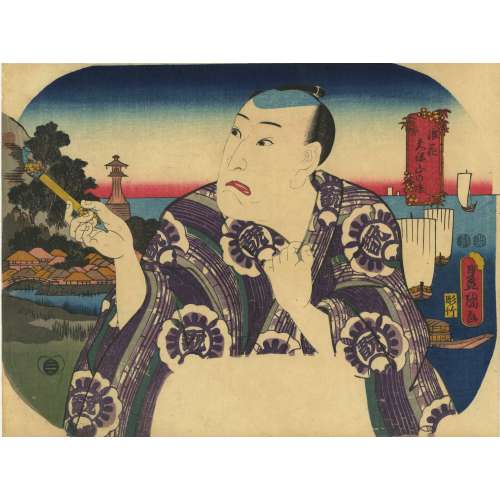
 As noted by Horst Graebner, the gentleman also resembles the character on another Kunisada's actor print, published in 1852 (Waseda University Cultural Resources Database № 114-0232):
As noted by Horst Graebner, the gentleman also resembles the character on another Kunisada's actor print, published in 1852 (Waseda University Cultural Resources Database № 114-0232):
